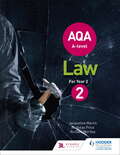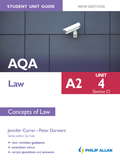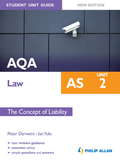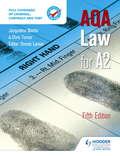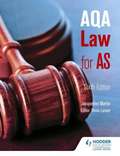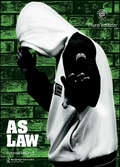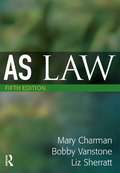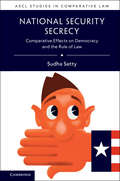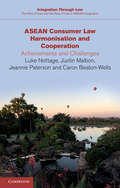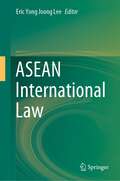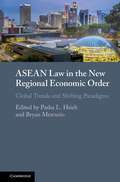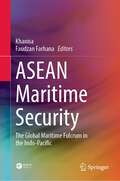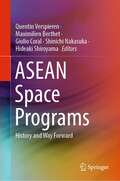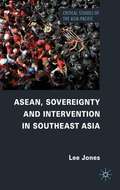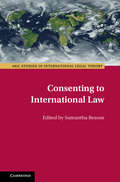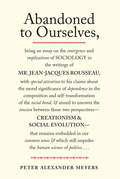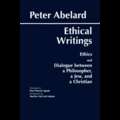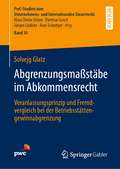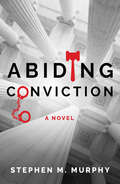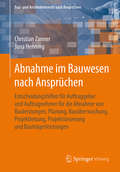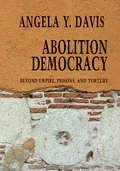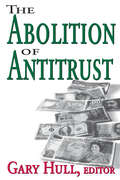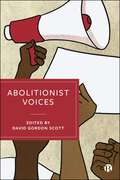- Table View
- List View
AQA A-level Law for Year 2
by Jacqueline Martin Nicholas Price Richard WortleyExam board: AQALevel: A-levelSubject: LawFirst teaching: September 2017First exams: Summer 2019This title has been selected for an AQA approval process.Accurately cover the breadth of content in the new 2017 AQA A-level specification with this textbook written by leading Law authors, Jacqueline Martin, Richard Wortley and Nicholas Price.This engaging and accessible textbook provides coverage of the new AQA A-level Law specification and features authoritative and up-to-date material on the important changes to the law.- Book 2 includes the second section of all mandatory units and both the Human Rights Law and Contract Law optional units.- Important, up-to-date and interesting cases and scenarios highlight key points.- Discussion and activity tasks increase your students' understanding of more difficult concepts.- Practice questions and 'check your understanding' questions to help you prepare for your exams.Authors:- Jacqueline Martin LLM has ten years' experience as a practising barrister and has taught law at all levels.- Richard Wortley has taught law at all levels. He has held a number of examining and assessing roles over the past 25 years. He retired from a management position in a large FE College to work freelance in law teacher support, writing and assessment work.- Nicholas Price is an experienced teacher of Law and an A-Level Law textbook author.
AQA A2 Law Student Unit Guide New Edition: Unit 4 (Section C) Concepts of Law
by Peter Darwent Jennifer CurrerWritten by senior examiners, Jennifer Currer and Peter Darwent, this AQA A2 Law Student Unit Guide is the essential study companion for Unit 4: Concepts of Law.This full-colour book includes all you need to know to prepare for your unit exam: clear guidance on the content of the unit, with topic summaries, knowledge check questions and a quick-reference index examiner's advice throughout, so you will know what to expect in the exam and will be able to demonstrate the skills required exam-style questions, with graded student responses, so you can see clearly what is required to get a better grade
AQA AS Law Student Unit Guide New Edition: Unit 2 The Concept of Liability
by Peter Darwent Ian YuleWritten by senior examiners, Ian Yule and Peter Darwent, this AQA AS Law Student Unit Guide is the essential study companion for Unit 2: The Concept of Liability.This full-colour book includes all you need to know to prepare for your unit exam: clear guidance on the content of the unit, with topic summaries, knowledge check questions and a quick-reference index examiner's advice throughout, so you will know what to expect in the exam and will be able to demonstrate the skills required exam-style questions, with graded student responses, so you can see clearly what is required to get a better grade
AQA Law for A2 Fifth Edition
by Jacqueline Martin Denis LancerThe most up-to-date AQA A2 Law textbook - from the number 1 A-Level Law author - that will prepare your for your exams. This engaging and accessible textbook provides complete coverage of the whole AQA A2 specification. From the leading law author, it is comprehensive, authoritative and updated with important changes to the law. Now includes: - Fully updated with the latest changes to criminal, tort and contract law - Important and interesting cases and scenarios to highlight key points - Activities to increase your students'understanding of more difficult concepts - Examination practice, past-paper questions and self-test questions to help your students prepare for their exams
AQA Law for AS Sixth Edition
by Jacqueline Martin Denis LancerCover all the AQA AS level topics clearly with this textbook written by the leading A level Law author.Up to date, accessible and now with more past papers to prepare students for their exams, AQA Law for AS, Fifth Edition, is matched to the course. Jacqueline Martin has helped hundreds of thousands be successful in studying law. She has ensured that this book addresses every topic in detail.Revised to reflect recent changes in the legal system, in areas such civil cases, legal profession, legal aid, sentencing and jury service
AS Law
by Andrew MitchellWritten for sixth form and college students, AS Law covers the content of AS Law for AQA and OCR students in a lively and reader-friendly style. Topics are broken down into manageable parts, with clear headings and are illustrated throughout with photographs, diagrams, boxes and illustrations. Each chapter includes: an introduction outlining learning objectives relating to the subject specifications 'developing the subject' sections explaining a particularly important or difficult point in more detail, designed to challenge more able students a list of useful websites enabling students to access primary law materials intended to support chapter-by-chapter reading 'it's a fact!' sections highlighting interesting and contemporary applications of the legal principle under discussion dedicated sections providing detailed examination of key cases, within the context of the chapter discussion hints and tips for revision topics and strategies helping students to prepare for the types of questions that are most likely to come up in exams. The book contains a wealth of opportunities to test and apply knowledge, with revision quizzes, quick tests and sample questions and answers within each chapter and there are additional opportunities for self-testing and revision available via the Companion Website. This third edition has been revised and updated to take into account the new 2008 AQA specifications and contains a new chapter on contract liabilities, as well as expanded material on sentencing and court procedures. It also addresses recent legal developments such as the establishment of the Ministry of Justice, changes in the legal profession and the constitution, and the reform of the House of Lords. AS Law provides a stimulating and exciting approach to the subject, profiling famous legal figures and examining law in films, fiction, non-fiction and on the internet whilst offering comprehensive coverage of the AQA and OCR subject specifications fulfilling all syllabus requirements.
AS Law
by Mary Charman Bobby Vanstone Liz SherrattThis latest edition of AS Law has been fully updated to meet the requirements of the most recent changes to the specifications of both AQA and OCR examination boards. This title is tailored to the NEW four-module specifications for both AQA and OCR (although also suitable for the existing six-module specifications) includes a new chapter on Contract as part of the section on The Concept of Liability contains coverage of recent legal changes includes the effects of the Constitutional Reform Act 2005, especially concerning appointment of judges and the role of senior officers, such as the Lord Chancellor; reform of the powers of the police; recent statutes and cases particularly useful in preparing for questions involving judicial precedent and statutory interpretation. is written by authors who are experienced teachers, writers and examiners for AS/A-level law.
ASCL Studies in Comparative Law: Comparative Effects on Democracy and the Rule of Law (ASCL Studies in Comparative Law)
by Sudha SettyExcessive government secrecy in the name of counterterrorism has had a corrosive effect on democracy and the rule of law. In the United States, when controversial national security programs were run by the Bush and Obama administrations - including in areas of targeted killings, torture, extraordinary rendition, and surveillance - excessive secrecy often prevented discovery of those actions. Both administrations insisted they acted legally, but often refused to explain how they interpreted the governing law to justify their actions. They also fought to keep Congress from exercising oversight, to keep courts from questioning the legality of these programs, and to keep the public in the dark. Similar patterns have arisen in other democracies around the world. In National Security Secrecy, Sudha Setty takes a critical and comparative look at these problems and demonstrates how government transparency, privacy, and accountability should provide the basis for reform.
ASEAN Consumer Law Harmonisation and Cooperation: Achievements and Challenges (Integration through Law:The Role of Law and the Rule of Law in ASEAN Integration #18)
by Caron Beaton-Wells Justin Malbon Luke Nottage Jeannie PatersonThis is the first Western-language research monograph detailing significant developments in consumer law and policy across the Association of Southeast Asian Nations (ASEAN), underpinned by a growing middle class and implementation of the ASEAN Economic Community from 2016. Eight chapters examine consumer law topics within ASEAN member states (such as product safety and consumer contracts) and across them (financial and health services), as well as the interface with competition law and the nature of ASEAN as a unique and evolving international organisation. The authors include insights from extensive fieldwork, partly through consultancies for the ASEAN Secretariat, to provide a reliable, contextual and up-to-date analysis of consumer law and policy development across the region. The volume also draws on and contributes to theories of law and development in multiple fields, including comparative law, political economy and regional studies.
ASEAN International Law
by Eric Yong Joong LeeThis book consists of updated and refreshed papers written by international law scholars and practitioners from the ASEAN region and published by the Journal of East Asia and International Law, comprehensively covering almost all contemporary international legal issues related to ASEAN.Legal analysis of the ASEAN integration as one community with one vision in this book provides readers with a better understanding of the current social climate and future developments of ASEAN. Each section within the book covers a highly topical issue on ASEAN cooperation and dispute resolution from an international law perspective. ASEAN is one of the biggest economic communities in the world and the ASEAN+3 covers nearly half of global GDP. Given the region’s global impact, this book is of interest to Asia watchers, academics and policymakers alike.
ASEAN Law in the New Regional Economic Order: Global Trends and Shifting Paradigms
by Bryan Mercurio Pasha L. HsiehThe fast-growing last decade of strong economic growth of the Association of Southeast Asian Nations (ASEAN) has played a critical role in Asia-Pacific regionalism and global trade. This book explores the concept of ASEAN law under the normative framework of the new regional economic order. It examines the roadmap of the new ASEAN Economic Community Blueprint 2025 by evaluating the impact of ASEAN trade agreements on domestic legislation on professional services, financial integration, investment disputes and digital trade. More importantly, it sheds light on the legal implications of ASEAN's agreements with China and India and the potential developments of mega-regional trade agreements such as the CPTPP and the RCEP. Hence, the legal analysis and case studies in the book offer a fresh view of Asia-Pacific integration and bridge the gap between academia and practice.
ASEAN Maritime Security: The Global Maritime Fulcrum in the Indo-Pacific
by Khanisa Faudzan FarhanaThis book covers various strategic issues around maritime security in terms of how Indonesia has sought to implement its Global Maritime Fulcrum (GMF) vision, evaluating its regional impact within ASEAN. The Global Maritime Fulcrum’ vision was declared by President Joko Widodo to refocus Indonesia’s development paradigm to prioritize its maritime aspect in the Indo-Pacific. Divided across five pillars, namely: maritime culture, maritime resource management, maritime infrastructure and connectivity development, maritime diplomacy and maritime defense, the book presents that the implementation of this vision will doubtless have a significant regional impact, particularly in setting regional maritime agendas. In promoting an understanding of the challenges presented in implementing the Global Maritime Fulcrum and unpacking its multifaceted impact in the region, this book delves into Indonesia’s maritime vision, the existing maritime arrangements within ASEAN, and Indonesia’s interests in terms of its political economy relating to the maritime sector, strategic security issues, maritime diplomacy, and related regional power dynamics. Translated from Bahasa Indonesia into English, the book is relevant to scholars and policymakers in maritime studies, international relations, and regional studies relating to politics and power dynamics in Indonesia, specifically, and ASEAN more broadly.
ASEAN Space Programs: History and Way Forward
by Hideaki Shiroyama Quentin Verspieren Maximilien Berthet Giulio Coral Shinichi NakasukaThis book presents the first-ever comprehensive analysis of ASEAN space development programs. Written by prominent actors in the region, it goes beyond a mere exposé of the history, current status and future plans of ASEAN space technology development and utilization programs, by analyzing the conditions in which a space program can be initiated in the region. It does so in two ways: on the one hand, it questions the relevance of and motivations behind the inception of space development programs in developing countries, and on the other hand, it focuses on the very specific context of ASEAN (a highly disaster-prone area shaped by unique political alliances with a distinctive geopolitical ecosystem and enormous economic potential, etc.). Last but not least, after having analyzed established and emerging space programs in the region, it provides concrete recommendations for any regional or extra-regional developing nation eager to gain a foothold in space. As such, this book offers a valuable resource for researchers and engineers in the field of space technology, as well as for space agencies and government policymakers.
ASEAN, Sovereignty and Intervention in Southeast Asia
by Lee JonesDrawing on the fields of political economy and historical sociology, Jones dispels the overwhelming consensus among scholars that members of the Association of Southeast Asian Nations (ASEAN) never interfere in the internal affairs of other states, and pioneers a new approach to the understanding of regional politics in Southeast Asia.
ASIL Studies in International Legal Theory: Consenting to International Law (Asil Studies In International Legal Theory Ser.)
by Samantha Besson Louis HillASIL Studies in International Legal Theory: Reexamining Customary International Law
by Brian D. LepardReexamining Customary International Law takes on the complex issues and controversies surrounding the history, theory, and practice of customary international law as it reexamines customary law's increasingly important role in world affairs. It incorporates the expertise of distinguished authors to probe many difficult issues that remain unresolved concerning the doctrine of customary law. At the same time, this book engages in a profound exploration of the practical role of customary international law in a variety of important fields, including humanitarian law, human rights law, and air and space law.
ASIL Studies in International Legal Theory: Theoretical Boundaries of Armed Conflict and Human Rights
by Ohlin Jens DavidIn the last two decades, human rights law has played an expanding role in the legal regulation of wartime conduct. In the process, human rights law and international humanitarian law have developed a complicated sibling relationship. For some, this relationship is viewed as a mutually reinforcing effort between like-minded regimes designed to civilize human behavior. For others, the relationship is a more complicated sibling rivalry. In this book, an unparalleled collection of legal theorists examine the relationship between these two bodies of law. Each chapter skilfully maps the possibilities of harmonization while, at the same time, raising cautionary flags about the limits of that project. The authors not only chart the existing state of the law, but also debate the normative implications of the continuing influence of human rights norms on current practices including torture, targeted killings, the conduct of non-international armed conflicts, and post-war state building.
Abandoned to Ourselves
by Peter Alexander MeyersIn this extraordinary work, Peter Alexander Meyers shows how the centerpiece of the Enlightenment--society as the symbol of collective human life and as the fundamental domain of human practice--was primarily composed and animated by its most ambivalent figure: Jean-Jacques Rousseau. Displaying this new society as an evolving field of interdependence, Abandoned to Ourselves traces the emergence and moral significance of dependence itself within Rousseau's encounters with a variety of discourses of order, including theology, natural philosophy, and music. Underpinning this whole scene we discover a modernizing conception of the human Will, one that runs far deeper than Rousseau's most famous trope, the "general Will." As Abandoned to Ourselves weaves together historical acuity with theoretical insight, readers will find here elements for a reconstructed sociology inclusive of things and persons and, as a consequence, a new foundation for contemporary political theory.
Abelard: Ethical Writings
by Paul V. Spade Marilyn Mccord Adams Peter AbelardAbelard's major ethical writings--Ethics, or Know Yourself, and Dialogue between a Philosopher, a Jew and a Christian, are presented here in a student edition including cross-references, explanatory notes, a full table of references, bibliography, and index.
Abgrenzungsmaßstäbe im Abkommensrecht: Veranlassungsprinzip und Fremdvergleich bei der Betriebsstättengewinnabgrenzung (PwC-Studien zum Unternehmens- und Internationalen Steuerrecht #10)
by Solvejg GlatzAusgehend von dem Veranlassungsprinzip als tätigungsbezogenem Grundprinzip der Abgrenzung und dessen Konkretisierung durch den Fremdvergleichsgrundsatz analysiert die Arbeit die bisherige BFH-Rechtsprechung und diskutiert ausgewählte Fragestellungen der abkommensrechtlichen Betriebsstättengewinnabgrenzung. Es wird herausgearbeitet, dass sowohl dem Art. 7 OECD-MA als auch den sog. Betriebsstättenvorbehalten ein einheitlicher veranlassungsbasierter Abgrenzungsmaßstab zugrunde liegt, der an das spezifisch abkommensrechtliche Verständnis der Unternehmenstätigkeit anknüpft. Nach kommentarähnlicher Darstellung und Diskussion der Änderungen durch den Authorized OECD Approach (AOA) wird gezeigt, dass auch der dem AOA zugrunde liegende Abgrenzungsmaßstab veranlassungsbasiert ist, wenngleich es aufgrund der abweichenden Anknüpfung an Personalfunktionen im Einzelfall zu unterschiedlichen Zuordnungsergebnissen kommen kann. Zugleich werden Vorschläge für einzelne gesetzgeberische Nachbesserungen der Umsetzungsvorschrift des § 1 Abs. 5 AStG gemacht.
Abiding Conviction (A Dutch Francis Thriller #3)
by Stephen M. MurphyLawyer Dutch Francis faces an impossible situation—search for your missing wife or defend your high-profile client Dutch Francis is a defense attorney in the case of a judge accused of killing his wife. Just as the trial is about to begin, Ginnie Turner, Dutch's wife and TV news broadcaster, goes missing. Under extreme duress, Dutch tries to extricate himself as the judge's attorney—or at least postpone the trial. The judge insists that the trial proceed without delay and that Dutch remain his attorney. Exhausted by the murder trial, Dutch confronts an ineffectual police department, suspicious that he is involved in his wife's disappearance. He takes matters into his own hands as he struggles to balance both responsibilities—the trial and finding his wife—pushing him to the brink of losing everything he holds dear. At first Dutch suspects that Ginnie was kidnapped in retaliation for her recent stories about sex scandals. But after receiving bits of her in the mail—fingernails, hair—he realizes the kidnapper's intent may be to punish him. Could his defense of the judge be the reason?Fans of John Grisham and Scott Turow will love the courtroom drama
Abnahme im Bauwesen nach Ansprüchen: Entscheidungshilfen für Auftraggeber und Auftragnehmer für die Abnahme von Bauleistungen, Planung, Bauüberwachung, Projektleitung, Projektsteuerung und Bauträgerleistungen (Bau- und Architektenrecht nach Ansprüchen)
by Christian Zanner Jana HenningDieses Buch unterstützt den Immobilienentwickler und alle am Bau Beteiligten im Umgang mit der nicht immer einfachen Thematik der Abnahme. Welche Formen der Abnahme gibt es? Richtet sie sich nach dem BGB oder der VOB? Welche Besonderheiten gibt es im Architekten- und Ingenieurrecht zu beachten? Wie ist die Abnahme beim Bauträgervertrag zu handhaben? Wann kann eine Teilabnahme gefordert werden und wann kann die Abnahme verweigert werden? Die Abnahme ist in der Baupraxis von herausragender Bedeutung. Das Verständnis der einzelnen Tatbestände und der Wirkung der Abnahme ist für den Immobilienentwickler, Auftraggeber, Architekten, Ingenieure und Bauunternehmen für die Praxis unerlässlich. Die neue VOB/B 2016 ist bereits berücksichtigt worden und im Wortlaut beigefügt.
Abolition Democracy: Beyond Empire, Prisons, and Torture (Open Media Series)
by Angela Y. DavisRevelations about U.S policies and practices of torture and abuse have captured headlines ever since the breaking of the Abu Ghraib prison story in April 2004. Since then, a debate has raged regarding what is and what is not acceptable behavior for the world's leading democracy. It is within this context that Angela Davis, one of America's most remarkable political figures, gave a series of interviews to discuss resistance and law, institutional sexual coercion, politics and prison. Davis talks about her own incarceration, as well as her experiences as "enemy of the state," and about having been put on the FBI's "most wanted" list. She talks about the crucial role that international activism played in her case and the case of many other political prisoners.Throughout these interviews, Davis returns to her critique of a democracy that has been compromised by its racist origins and institutions. Discussing the most recent disclosures about the disavowed "chain of command," and the formal reports by the Red Cross and Human Rights Watch denouncing U.S. violation of human rights and the laws of war in Guantánamo, Afghanistan and Iraq, Davis focuses on the underpinnings of prison regimes in the United States.
Abolition of Antitrust
by Gary HullThe Abolition of Antitrust asserts that antitrust laws-on economic, legal, and moral grounds-are bad, and provides convincing evidence supporting arguments for their total abolition. Every year, new antitrust prosecutions arise in the U.S. courts, as in the cases against 3M and Visa/MasterCard, as well as a number of ongoing antitrust cases, such as those involving Microsoft and college football's use of the Bowl Championship Series (BCS). Gary Hull and the contributing authors show that these cases-as well as the Sherman Antitrust Act itself-are based on an erroneous interpretation of the history of American business, premised on bad economics. They equivocate between economic and political power-the power to produce versus the power to use physical force. For Hull, antitrust prosecutions are based on a horrible moral inversion: that it is acceptable to sacrifi ce America's best producers. The contributors explain how key antitrust ideas, for instance, "monopoly," "restraint of trade," and "anticompetitive behavior," have been used to justify prosecution, and then make clear why those ideas are false. They sketch the historical, legal, economic, and moral reasoning that gave rise to the passage and growth of antitrust legislation. All of the theoretical points in this volume are woven around a number of fascinating cases, both historical and current-including the Charles River Bridge, Alcoa, General Electric, and Kellogg/General Mills. Designed for the uninformed but educated layman, The Abolition of Antitrust makes positive arguments in defense of wealth creation, business, and profi t, explains the proper role of government, and offers a rational view of the meaning of contract and economic freedom. AldineTransaction www.transactionpub.com ISBN: 978-1-4128-0502-5 Library of Congress: 2004058124 Printed in the U.S.A. Cover design by Ellen F. Kane "The essays in this book present a sustained economic, historical, moral, and legal broadside against the various federal statutes known as antitrust doctrine. They explode the cherished myths underlying the antitrust laws, and expose their intellectual fountainhead in a morality of self-sacrifice that is incompatible with individual rights, free enterprise, and objective law. With the publication of this text, businessmen, lawyers, economists, policymakers,legislators, and judges finally have access to a systemic critique of the antitrust laws. From here on, if antitrust continues to violate the rights of businessmen and to ravage the American economy, it is not for lack of knowing how and why."-Adam Mossoff, assistant professor of law, Michigan State University College of Law.
Abolitionist Voices
by David Gordon Scott, Johannes FeestWhy have so many radical thinkers advocated for the abolition of prisons and punishment? And why have their ideas been so difficult to popularize or garner the political will for change? This book outlines several different approaches to penal abolitionism and showcases their calls for the ending of legal coercion, domination, and repression. This exciting and innovative edited collection shows how abolitionist ideas have continued topicality and relevance in the present day and how they can collectively help with devising new ways of thinking about social problems, as well as suggesting alternatives to existing penal policies, practices and institutions.
